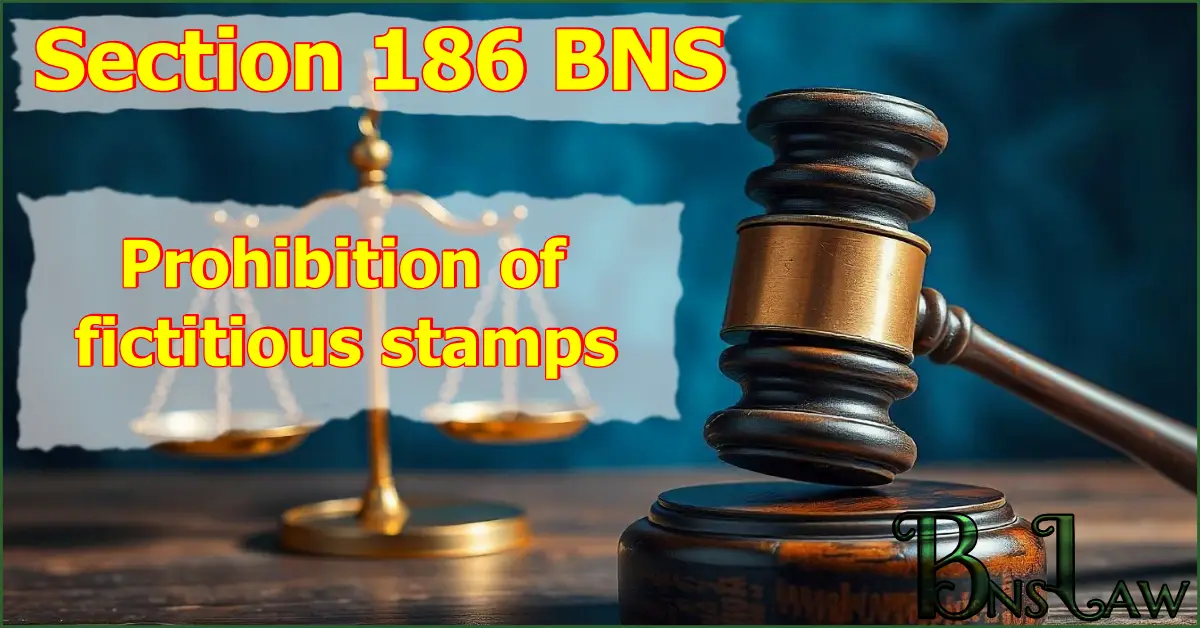Section 186 BNS | BNS 186
186(1) BNS
Whoever—
- makes, knowingly utters, deals in or sells any fictitious stamp, or knowingly uses for any postal purpose any fictitious stamp; or
- has in his possession, without lawful excuse, any fictitious stamp; or
- makes or, without lawful excuse, has in his possession any die, plate, instrument or materials for making any fictitious stamp, shall be punished with fine which may extend to two hundred rupees.
186(2) BNS
Any such stamp, die, plate, instrument or materials in the possession of any person for making any fictitious stamp may be seized and, if seized shall be forfeited.
186(3) BNS
In this section “fictitious stamp” means any stamp falsely purporting to be issued by Government for the purpose of denoting a rate of postage, or any facsimile or imitation or representation, whether on paper or otherwise, of any stamp issued by Government for that purpose.
186(4) BNS
In this section and also in sections 178 to 181 (both inclusive), and sections 183 to 185 (both inclusive) the word “Government”, when used in connection with, or in reference to any stamp issued for the purpose of denoting a rate of postage, shall, notwithstanding anything in clause (12) of section 2, be deemed to include the person or persons authorised by law to administer executive Government in any part of India or in any foreign country.
READ OTHER SECTIONS OF CHAPTER X — OF OFFENCES RELATING TO COIN, CURRENCY-NOTES, BANK-NOTES, AND GOVERNMENT STAMPS
FAQs of BNS Section 186
-
186 BNS punishment and fine
Fine under Section 186 of the BNS: Fine of 200 rupees.
-
186 BNS cognizable or not
The offence under Section 186 of the BNS is cognizable.
-
186 BNS bailable or not
The offence under Section 186 of the BNS is bailable.
-
186 BNS trial court
Offence specified in Section 186 of the BNS is triable by Any Magistrate.
Important Points
- Cognizable Offences: These are offences where a police officer can arrest a person without a warrant.
- Non-Cognizable Offences: These are offences where a police officer cannot arrest a person without a warrant.
- Bailable Offences: These are offences where the accused can get bail from the police station itself. All bailable offences are listed in the First Schedule of the Bharatiya Nagarik Suraksha Sanhita (BNSS).
- Non-Bailable Offences: Offences in which bail is not granted directly from the police station but after hearing the case in the court, the judge decides when bail will be granted. All non-bailable offences are listed in the first schedule of the Bharatiya Nagarik Suraksha Sanhita (BNSS).
- In the above FAQ, “trial court” means the court that has jurisdiction to try the offence.
- In the above FAQ, the expression “Magistrate of the first class” and “Any Magistrate” does not include Executive Magistrates.
Read other Sections of the BNS
Reference Link: New Criminal Laws (BNS), Ministry of Home Affairs







